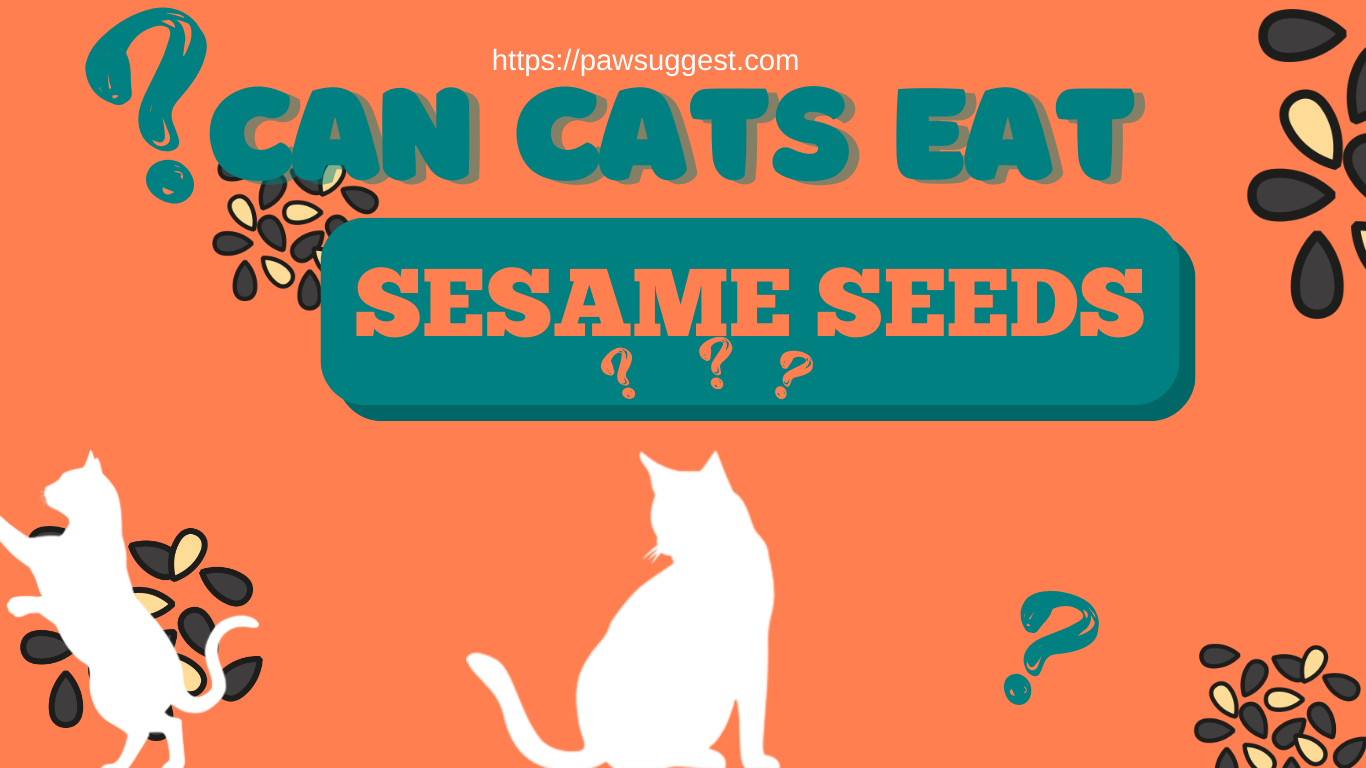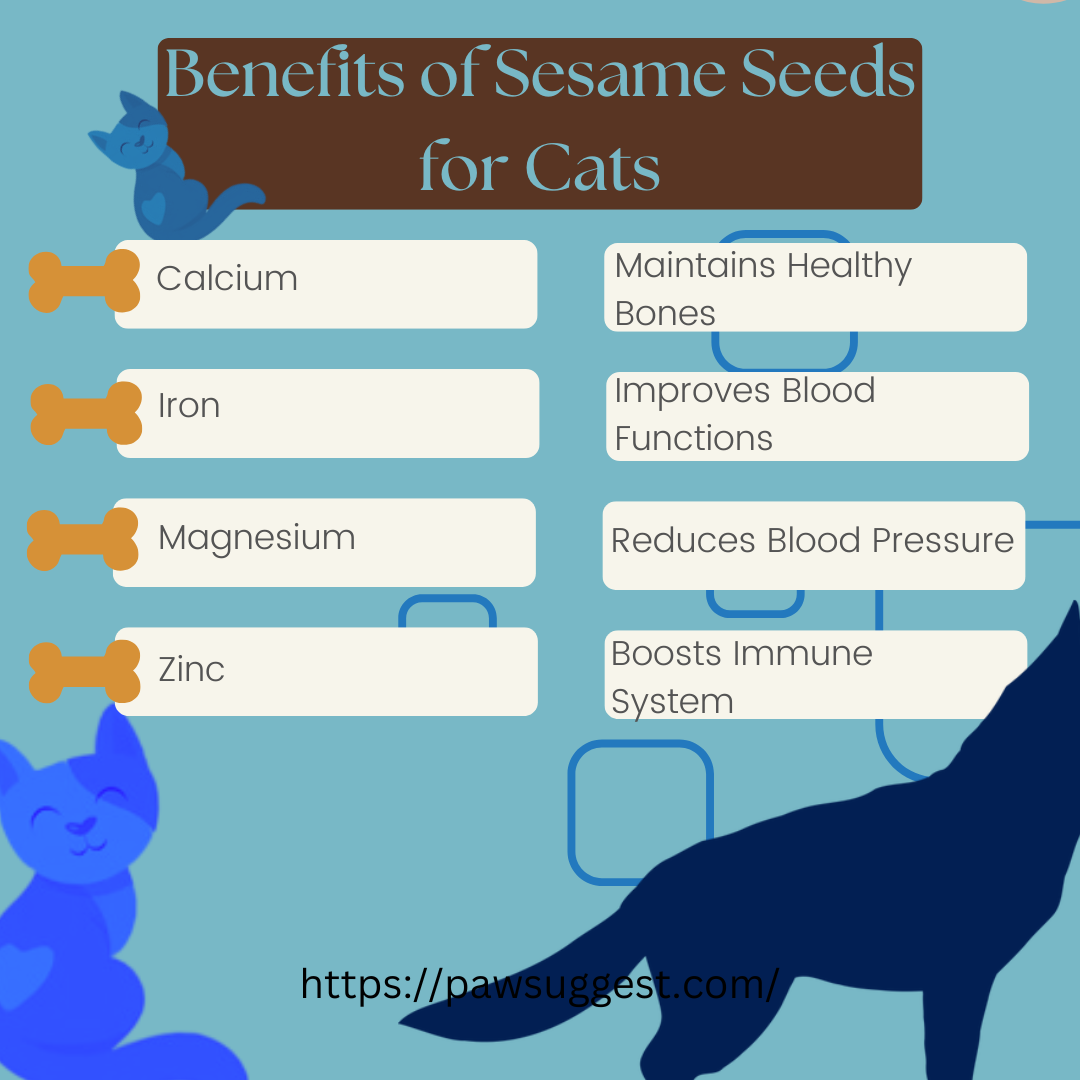Cats are super curious creatures who frequently seek out meals that their human friends enjoy.
Even if the food isn’t particularly nutritious, it’s the simplest method for them to explore. And among them is sesame seed. Sesame seeds grab their interest with their nutty flavor and crisp texture.
“But are these miniature, flavour-packed seeds safe treats?” Or, “Should they stay separated from your cat?”
The good thing is that sesame seeds are not harmful to your cat and are safe to eat in balance. Although sesame seeds are not hazardous or harmful, we don’t recommend that your cats eat them.
Keep on reading to learn more details about it!

Are Sesame Seeds Safe for Cats to Eat?
Certain foods that are safe for humans are unsuitable for our feline companions. Many foods are poisonous, and your cat may not be able to digest them properly, which could lead to illness.
The positive aspect of sesame seeds is that cats are not at risk from them in terms of toxicity. Your cat can safely consume them.
Sesame seeds may be advantageous to your cat, but this does not imply that they are nutrient-dense. Sesame seeds don’t provide all the nutrients your cat needs to survive, regardless of whether they are healthy for people.
But what does that actually mean? In other words, cats are obligate carnivores. They cannot depend on a plant-based diet; they require meat. It all originates from the digestive system of cats.
Sesame seeds and other plant-based foods are not as easily digested by them as they are by humans or even dogs.
Risks If Your Cat Eats Sesame Seeds?
Although sesame seeds are not harmful to cats, consuming them could pose many risks:
● Choking Issue:
Because they are spherical and small, sesame seeds can choke a kitty. This is particularly true for cats, who commonly consume without thoroughly chewing their food.
● Allergic Response:
Cat allergies to sesame seeds are rare but can cause symptoms like skin irritation, itching, and gastrointestinal problems.
● Digestive Problem:
Due to their delicate digestive systems, cats may have upset stomachs. Their symptoms include vomiting, diarrhea, or constipation if they consume excessive amounts of sesame seeds without properly chewing them first.
● Caloric Density:
If eaten in excess, sesame seeds can cause weight gain and obesity in cats. It occurs due to their high fat and calorie content.
Benefits Of Sesame Seed For Cats

Sesame seeds, like other seeds, are nutritious. They contain vitamins, minerals, and antioxidants, which can help your cat’s body work properly and protect him from some ailments.
Sesame seeds include the following minerals:
- Calcium maintains healthy bones.
- Iron is needed for optimal blood function.
- Magnesium helps reduce blood pressure.
- Zinc maintains a healthy immune system.
Sesame seeds include some of the following vitamins:
- Vitamin B promotes a healthy metabolism.
- Vitamin E helps keep the heart and eyes healthy.
Sesame seeds are also high in antioxidants, including sesamin and sesamolin, which can aid in the battle against several diseases, including cancer. They are also high in fiber, which can help to keep your cat’s digestive tract healthy.
Sesame seeds also contain plant-based proteins, which can help your cat’s muscles stay healthy. One of the most notable benefits of sesame seeds is that they are known to decrease cholesterol, which is a significant cause of heart disease.
How To Feed Sesame Seeds To Your Cat
Feeding sesame seeds to your cat should be approached with caution and care to ensure their safety and enjoyment.
Here’s a step-by-step guide on properly doing it:
● Choose Whole or Ground Seeds:
You can serve whole sesame seeds or ground them to a fine powder with a mortar, pestle, or spice grinder. Grinding the seeds may make them easier for your cat to digest.
● Offer as a Standalone Treat:
If your cat likes the taste and feel of sesame seeds, you can serve them as a solitary treat. Place a few seeds on a dish or in a small bowl for your cat to munch on.
● Mix with Food:
Sprinkle a few sesame seeds over your cat’s normal meal. Start with a pinch or two and watch how your cat reacts. You can progressively raise the amount if they tolerate it well.
● Consult with Your Vet:
Before adding any new food to your cat’s diet, contact your veterinarian. They can make personalized recommendations based on your cat’s specific nutritional requirements and health status.
Frequently Asked Questions (FAQs)
● Is it safe for cats to eat sesame seeds?
What’s more, sesame is full of minerals, such as zinc, calcium, and magnesium, which can strengthen your cat’s bones. Even though sesame seeds can benefit your cat’s health, you should still offer them only as an occasional treat.
● Is sesame oil safe for cats to eat?
Cats love sinking their teeth into meaty meals and treats. They reap the most benefits from this food since they’re obligate carnivores. But a little sesame oil no more than once a week is ok. Your cat can even gain some nutritional value from sesame oil.
● Are cats allergic to sesame?
Sesame seed allergies are rare in cats, but some cats can be allergic to the seeds. Symptoms of an allergic reaction may include itching, swelling, and difficulty breathing.
Final Words
Overall, sesame seeds are not poisonous to cats, so it’s generally not a huge concern if your cat consumes them. They shouldn’t be consumed, though, as they aren’t the healthiest cat snacks.
You can give your cat a tiny quantity of sesame seeds if they like to eat them. Just remember that healthier food options are available, such as meat-based treats or catnip.
As always, consulting with your veterinarian before introducing new foods into your cat’s diet is the purrfect way to ensure their health and happiness. Moreover, if you are also curious about giving Quinoa (seeds) and Poppy seeds to your cat, do check out our articles on them.

